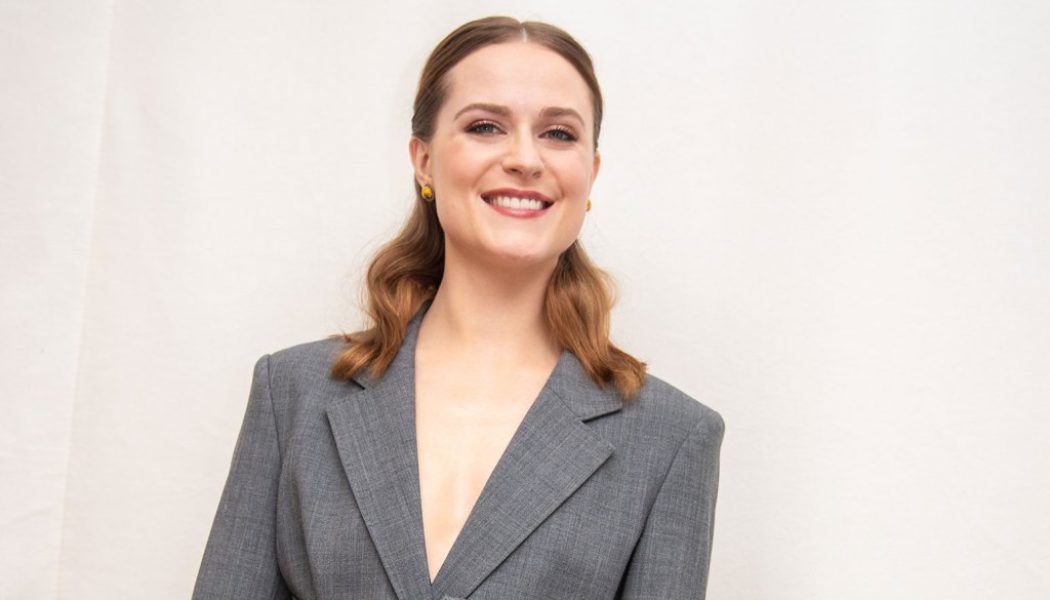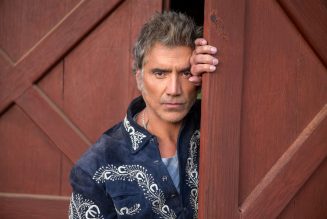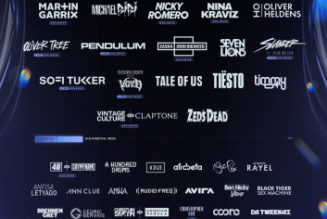
Evan Rachel Wood appeared on The Daily Show on Monday night (March 14) to talk about the 16-year journey she took to confronting her alleged abuser and the reason she hopes her new two-part documentary, Phoenix Rising, could help other people who feel trapped in a cycle of abuse come forward and speak their truth.
“I don’t believe that he will stop until he is stopped,” she said of Marilyn Manson, her former fiancé, who she claims in the film methodically groomed her when she 18 and isolated her before allegedly subjecting the Westworld star to ritualistic abuse. “And sometimes the greatest act of love is stopping that person from hurting themselves or hurting anybody else.”
The nearly three-hour mini-series, directed and produced by acclaimed Oscar-nominated filmmaker Amy Berg (best known for her Catholic church sex abuse film Deliver Us From Evil and the sex abuse in Hollywood doc An Open Secret), premieres on HBO Max tonight (March 15). The first part chronicles Wood’s rise in Hollywood as a 13-year-old star-in-the-making and her chance meeting with Manson (born Brian Warner) at a party when she was 18. In the film she describes how that evening turned into a years-long relationship and engagement with the decades-older rocker that she claims included vicious sexual, physical and emotional abuse, including alleged anti-Semitic taunts and threats against the actress, who is Jewish; Manson has repeatedly denied the allegations and earlier this month sued Wood for defamation over the accusations, which the suit claimed is part of an “organized attack.”
Wood explained why she thinks it took 16 years for her to open up about her alleged abuse at the hands of Manson, who has also been accused of similar acts by a number of other women, which he has also denied. “You’re running, you’re trying to forget it happened, and then, of course, it catches up with you and I couldn’t run from it,” Wood said, explaining that she threw herself into therapy after years of vowing to “take it to my grave” over her fears about making her experience public. “I was that afraid of retaliation, I just did not feel safe and I felt very alone. I thought I was the only one.”
The latter sentiment is one she’s said is common among survivors of abuse, another reason she decided to share her story. After testifying in front of Congress for the Sexual Assault Survivors’ Bill of Rights in 2018, Wood said she thought she had said all there was to say, though at the time she did not publicly reveal her alleged abuser. But when people began emerging online with similar stories, with “very specific details,” she said she recognized as things you could not know unless you’d stood toe-to-toe with your abuser, she knew she had to break her silence.
“I knew it was real, and that’s when it changed,” she told Noah, adding that the film also tackles Manson’s own self-reported history of childhood trauma because, “I do believe in accountability and healing and reform and I think there is a time and a space for that.” Without going to the root of violence in the home, Wood said, we cannot see that “violence begets violence.”
“There are people who can stop the cycle and there are people, like Brian,” she said, naming Manson for the first and only time using his birth name more than half-way into the interview. “That don’t want help. And he’s had every opportunity. He’s had so many people try. And he has refused it every time.”
Wood also noted that the statute of limitations on sexual abuse was one-to-three years when she started advocating for the Phoenix Act in California — though she said it often takes 7-10 years to “process, understand and heal” from trauma — a time frame she described as “nothing” to a survivor still trying to come to terms with the physical, mental and emotional impact of abuse.
She pointed out that she spent a total of four years with “him” (presumably Manson), someone she called expert at “brainwashing” and isolation, comparing that time to being in a cult. “When you’re in it, you can’t see the forest through the trees, up is down, down is up. It’s you two against the world and it is a secret that nobody will ever be able to understand,” she said. “And you gotta to break free of that illusion, and it takes time.”
Watch Evan Rachel Wood on The Daily Show below.
[embedded content]
Stories about sexual assault allegations can be traumatizing for survivors of sexual assault. If you or anyone you know needs support, you can reach out to the Rape, Abuse & Incest National Network (RAINN). The organization provides free, confidential support to sexual assault victims. Call RAINN’s National Sexual Assault Hotline (800.656.HOPE) or visit the anti-sexual violence organization’s website for more information.
[flexi-common-toolbar] [flexi-form class=”flexi_form_style” title=”Submit to Flexi” name=”my_form” ajax=”true”][flexi-form-tag type=”post_title” class=”fl-input” title=”Title” value=”” required=”true”][flexi-form-tag type=”category” title=”Select category”][flexi-form-tag type=”tag” title=”Insert tag”][flexi-form-tag type=”article” class=”fl-textarea” title=”Description” ][flexi-form-tag type=”file” title=”Select file” required=”true”][flexi-form-tag type=”submit” name=”submit” value=”Submit Now”] [/flexi-form]










Tagged: Culture, entertainment blog, music blog, NEWS, TV, TV/Film